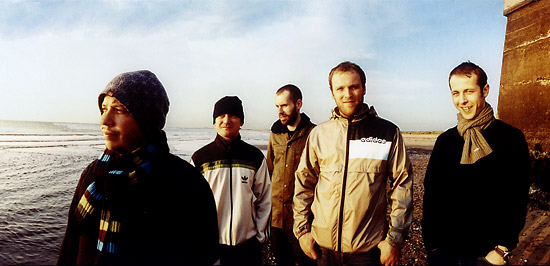
So there Mogwai was, recalls guitarist Dominic Aitchison: fresh off a transatlantic flight to Orlando, gearing up for the American leg of its 2004 tour opening for the Cure. Scotland’s loudest avant-noise band tramped sleepily over the tarmac, through customs and into baggage claim, where bored chauffeurs and cabbies stood around holding signs bearing the names of their pickups. One sign in particular caught the quintet’s attention.
“It said, ‘Mr. and Mrs. Beast,’” says Aitchison, savoring the sound of the words. “We hung about as long as we could. We craned our necks all around, but they never showed.”
Despite its penchant for sinister, doom-laden instrumentals, Mogwai has a fully honed sense of absurdist humor, and thus the title of the band’s fifth album, Mr. Beast (Matador), was fixed long before its first notes were ever recorded. As it turns out, the title is a happy fit.
“We wanted to make this album sound a little closer to what we’ve been doing live,” says Aitchison. “On the last couple of studio albums, we’d been trying to bring in new sounds, loading the music up with a lot of brass and strings and such. But we didn’t have the money to take many people on the road with us, so we’d end up playing the louder, noisier songs, since they’re the more enjoyable ones to do.”
Mogwai had also reached an aesthetic impasse with its recent sample-and-programming experiments. “We just couldn’t think of a way to pull it off that would be interesting,” says Aitchison. “So we weren’t really interested in doing it at all. Whenever we go see bands that rely heavily on computers and samples in their live shows, it always just seems a bit, I don’t know … unconvincing.”
So, with Mogwai’s desire to get loud again, Mr. Beast was recorded in the band’s Castle Of Doom studios over two months in late 2005. The album blends the experimental spirit of Mogwai’s last two studio records (2003’s Happy Songs For Happy People and 2001’s Rock Action) with stripped-down arrangements, making it a partial return to the aggressive sonic assault of the band’s early work. Interwoven among the noise-heavy “Glasgow Mega-Snake” and devastating closer “We’re No Here,” however, are moments of deep tranquility, the best of which are pedal-steel-soaked weeper “Acid Food” and “I Chose Horses” (which features a spoken-word performance by Tetsuya Fukagawa of Japanese hardcore band Envy). Mr. Beast’s overall preponderance of vocals is, in fact, a departure from Mogwai’s previous work, but it didn’t become apparent to Aitchison until the final sequencing process.
“That was a big change,” he says. “I think the difference with the vocals on Mr. Beast isn’t simply that they’re there, but that they’re mixed up front. Before, we’d tried to bury them under the rest of the instruments; here, they’re right on top.”
So is Mogwai getting more outspoken as the band enters its second decade?
“Nah,” replies Aitchison after a moment, thinking again of that peculiar sign in the Orlando airport. “The European press have all been going on about the title: ‘Ah, it’s George Bush, right?’ Well, no, not really. Though, I suppose, if you want it to be … “
—Eric Waggoner






